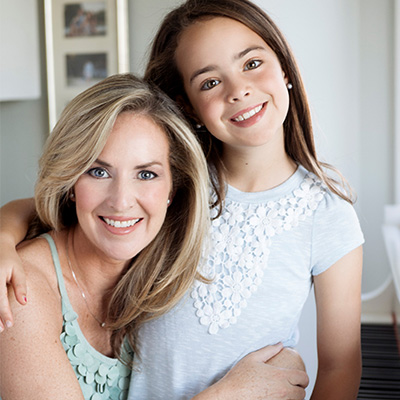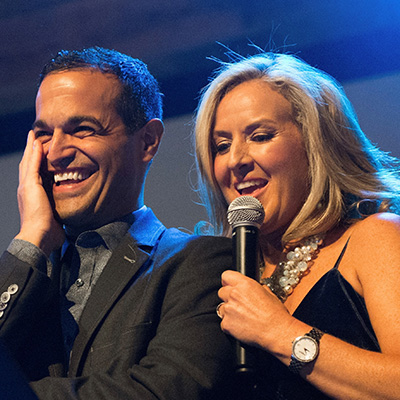Accelerating the Pace of Metastatic Breast Cancer Research

An unexpected diagnosis 
In August of 2015, Rebecca Timlin-Scalera, PhD, was celebrating her 43rd birthday in Paris with her husband and two children, savoring the last moments of summer and toasting to the year ahead with champagne at a bar near the top of the Eiffel Tower. It was a dream vacation by all accounts.
Just a few weeks later, the family was back home in Connecticut. The kids had started school, and Rebecca had returned to work at her neuropsychology practice. Everyone was settling into their routines when an unexpected diagnosis blindsided Rebecca: advanced breast cancer.
Despite being a lifelong athlete, leading a healthy lifestyle, getting regular mammograms, and having no family history of breast cancer, Rebecca was diagnosed with stage 4, or metastatic, breast cancer, as doctors believed the disease had already spread to her bones.
Rebecca, like so many others, was shocked to learn that metastatic breast cancer is not curable. She believed that breast cancer was one of the “good cancers,” so she was devastated to discover that metastatic breast cancer is underfunded . As a result, there were limited treatment options and minimal improvements in life expectancy outcomes.
Determined to make a difference 
Rebecca needed to learn more to figure out the best way to change the narrative and the outcomes around metastatic breast cancer. She immediately delved deeper into the research and statistics, educating herself in every way possible. What she learned took her aback — there was a huge discrepancy between early- and late-stage breast cancer in everything from research funding to treatment options to survival outcomes.
Around 6% of women with breast cancer are initially diagnosed with stage 4 disease, and approximately 30% of women diagnosed at earlier stages will later develop metastatic breast cancer. Men can also develop metastatic breast cancer. While the overall five-year survival rate for people with breast cancer in the United States has risen to 91%, for those with metastatic breast cancer, that figure is just 31%. According to the Metastatic Breast Cancer Alliance, less than 7% of breast cancer research dollars go to stage 4 disease.
Rebecca was determined to flip the script. She started The Cancer Couch Foundation in 2016 — in the midst of her own treatment, while raising two children and working as a neuropsychologist — to raise money for leading-edge scientific research, and to spread awareness around the lack of resources dedicated specifically to accelerating the pace of innovation in metastatic breast cancer treatments.
A volunteer-run organization that awards 100% of its proceeds to research, The Cancer Couch Foundation has raised over $6 million since its establishment, through year-round fundraising activities that include major events and creative concepts like The Cancer Beat concert series, the MOMbies international “dance to donate” sensation, the Bake It Happen campaign, and the Par 4 the Cure golf outing.
At Memorial Sloan Kettering Cancer Center (MSK), The Cancer Couch Foundation supports the work of Sarat Chandarlapaty, MD, PhD, the Naddisy Foundation Chair in Breast Cancer Research. Dr. Chandarlapaty and the scientists in his lab at MSK are pioneers in metastatic breast cancer research, and the discoveries they make lead to life-changing advances. Based on more than a decade of research led by Dr. Chandarlapaty, in 2023 the FDA approved a new drug, elacestrant (Orserdu®), for certain people with advanced or metastatic breast cancer.
Innovations like this are critical to giving people worldwide hope for brighter futures and fulfilling The Cancer Couch Foundation’s mission of accelerating progress for every person facing metastatic breast cancer.
An extraordinary legacy 
As she went through every new scan, test, treatment, surgery, and clinical trial, Rebecca always remained optimistic about her own future, and unrelenting in her dedication to improving the lives of all people with metastatic breast cancer. Rebecca channeled her passion, humor, creativity, and energy into The Cancer Couch Foundation, continuing to lead the organization’s fundraising and advocacy efforts.
Rebecca passed away in December 2019, leaving behind an extraordinary legacy in what she built. Today, The Cancer Couch Foundation is led by her husband, Tom Scalera, and driven by dozens of tireless volunteers who continue the organization’s crucial work, determined as ever to see a world in which every metastatic breast cancer diagnosis can be met with an effective treatment option — or even a cure.